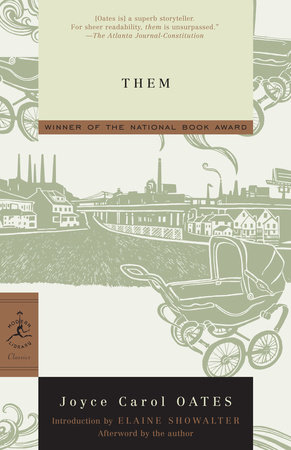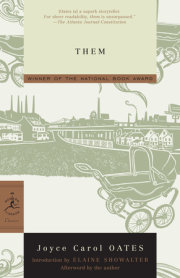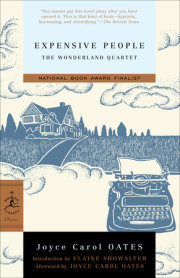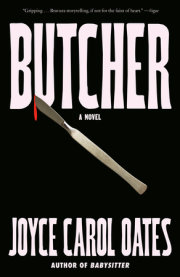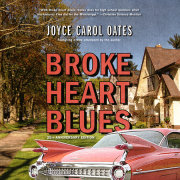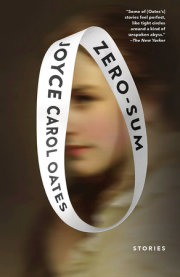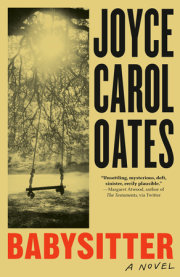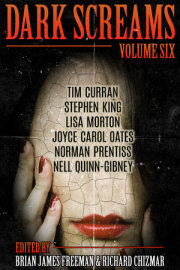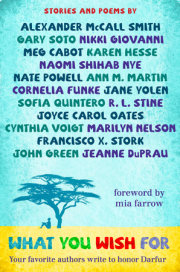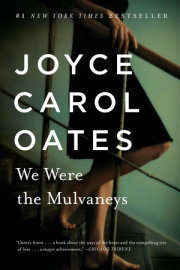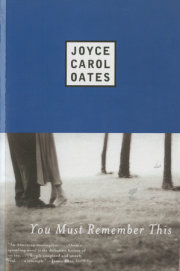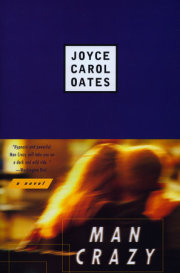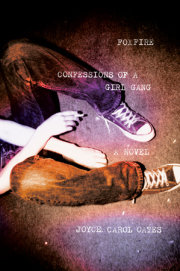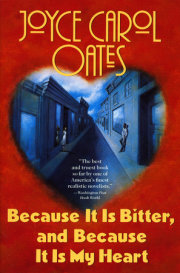Children of SilenceOne warm evening in August 1937 a girl in love stood before a mirror.
Her name was Loretta. It was her reflection in the mirror she loved, and out of this dreamy, pleasing love there arose a sense of excitement that was restless and blind--which way would it move, what would happen? Her name was Loretta; she was pleased with that name too, though Loretta Botsford pleased her less. Her last name dragged down on her, it had no melody. She stood squinting into the plastic-rimmed mirror on her bureau, trying to get the best of the light, seeing inside her high-colored, healthy, ordinary prettiness a hint of something daring and dangerous. Looking into the mirror was like looking into the future; everything was there, waiting. It was not just that face she loved. She loved other things. During the week she worked at Ajax Laundry and Dry Cleaners, and she was very lucky to have that job, and during the week the steamy, rushed languor of her work built up in her a sense of excitement. What was going to happen? Today was Saturday.
Her face was full, and there was a slight mischievous puffiness about her cheeks that made her look younger than she was--she was sixteen--and her eyes were blue, a mindless, bland blue, not very sharp. Her lips were painted a deep scarlet, exactly the style of the day. Her eyebrows were plucked in exactly the style of the day. Did she not dream over the Sunday supplement features, and did she not linger on her way to work before the Trinity Theater in order to stare at the pictures? She wore a navy-blue dress pulled in tight at the waist. Her waist was surprisingly narrow, her shoulders a little broad, almost masculine; she was a strong girl. Upon her competent shoulders sat this fluttery, dreamy head, blond hair puffed out and falling down in coquettish curls past her ears, past her collar, down onto her back, so that when she ran along the sidewalk it blew out behind her and men stopped to stare at her; never did she bother to glance back at these men--they were like men in movies who do not appear in the foreground but only focus interest, show which way interest should be directed. She was in love with the thought of this. Behind her good clear skin was a universe of skin, all of it healthy. She loved this, she was in love with the fact of girls like her having come into existence, though she could not have expressed her feelings exactly. She said to her friend Rita, "Sometimes I feel so happy over nothing I must be crazy." Dragging around in the morning, trying to get her father up and trying to get her brother Brock fed and out before somebody started a fight, still she felt a peculiar sense of joy, of prickly excitement, that nothing could beat down. What was going to happen? "Oh, you're not crazy," Rita said thoughtfully, "you just haven't been through it yet."
She combed her hair with a heavy pink brush. It worried her to see her curls so listless--that was because of the heat. From the apartment across the way, through the open window, she could hear a radio playing music that meant Saturday night, and her heart began to pound with anticipation of the long hours ahead during which anything might happen. Her father, who had been out of work for almost ten years, liked to lie in bed and drink and smoke, not caring that so many hours rushed by he'd never be able to get back--but Loretta felt that time was passing too quickly. It made her nervous. She scratched at her bare arm with the brush in a gentle, unconscious, caressing gesture, and felt the dreaminess of the late summer afternoon rise in her. In the kitchen someone sat down heavily, as if answering her, in response to her wondering.
"Hey, Loretta!" Brock called.
"Yeah, I'm coming." Her voice came out harsh and sounded of the dry cleaners and the street, but it was not her true voice; her true voice was husky and feminine.
She prepared supper for Brock. The kitchen was narrow, and he had to sit right in her way, so that she made a face and said, "Excuse me," ironically, squeezing past. Brock was dressed for Saturday night too. He wore a blue serge coat over gray trousers and a queer metallic bronze necktie. A necktie! It was part of Brock's batty style. He had turned twenty a few weeks before, which seemed to Loretta almost old; and on his pinched face an expression of premature cunning seemed to have frozen, as in a movie still. Like Loretta, he had blond hair, but it seemed to be darkening; he rarely washed it, maybe once a month--it was stiff with grease. He had a strong, angular face with prominent cheekbones. This had been their mother's face. Strange how, since their mother's death some years before, Loretta had begun to notice her sometimes in Brock's face. And in his sudden, impulsive bursts of rage--Brock was always incensed by the old man and certain noisy neighbors--she could see her mother's restless agitation; it was disturbing.
"Jesus Christ, is that perfume you're wearing?" Brock screwed up his face like a clown.
"Go to hell. You're not funny."
Brock laughed, meanly.
Loretta took a bowl of potatoes out of the icebox and put them into a frying pan; she had peeled them earlier. The grease sizzled and spat up at her. She resented cooking for her brother yet there was a strange pleasure in it. I do this. This is what I do. Brock liked her waiting on him, she knew. Sitting there at the end of the table so self-importantly, like the malicious spitting of grease: she had only to glance at his amused eyes to see how hateful he was.
"Look, what the hell is eating you?" Loretta cried.
Brock smiled innocently. "Is the old man back yet?"
"You know he isn't."
"How do I know? I've got X-ray eyes?"
"He went out this morning with that Cole to look at some vacant lot. Oh, I know it's crazy--don't look at me."
"What vacant lot? He's going to buy a vacant lot?"
"Ask him."
"With what? Where's the money? What's he going to buy it with?"
Brock was getting excited. Saliva shone on his lips.
"Brock, forget it! Pa isn't hurting anyone."
"He's sick. He should be carted away."
"Carted away where?"
"Should be locked up."
Brock leaned forward on his elbows and spoke in his rapid, insinuating voice, as if he meant something other than his words, and you were a fool not to catch on. Oh, he was hateful! He was Loretta's brother and in the years of their childhood he had done well by her--he'd fought with older kids who teased her, following the rule of the street, but that was maybe for his own honor, not her. At one time no one could have guessed that Brock Botsford, the long-limbed stooping kid with the blue-eyed stare and quick fists, would grow so much apart from the other boys, precocious, yet in a way stunted, into this strange, mock-serious old-young man. Beneath his sly words and his facial mannerisms, a perverse and malicious will. Loretta dreaded her girl friends talking with Brock, attracted by his cheap flashy clothes and movie-style, then edging away, nervously giggling, "Isn't that guy queer?" In that way that girls do, with absolute accuracy.
"Oh, you talk too much sometimes! Get a job yourself, a good job, if you think you're superior to him," Loretta said, incensed.
Copyright © 2000 by Joyce Carol Oates. All rights reserved. No part of this excerpt may be reproduced or reprinted without permission in writing from the publisher.

